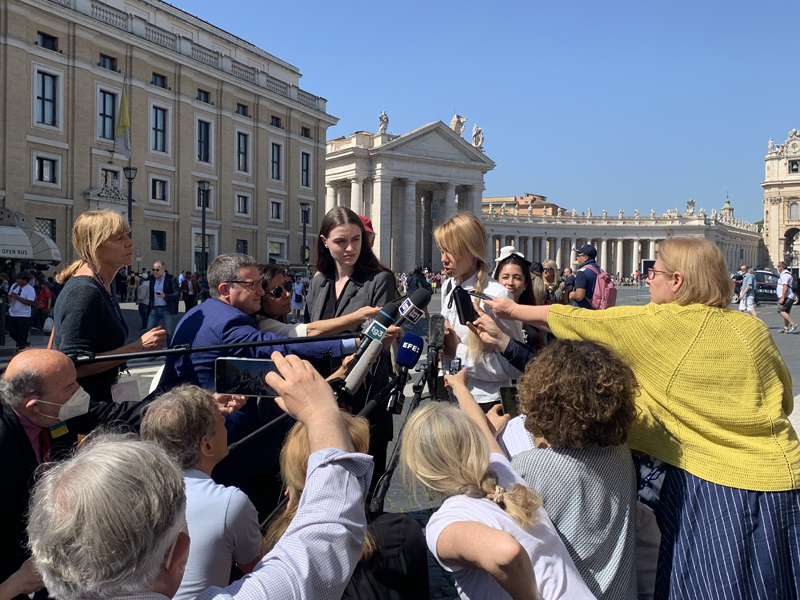By Cindy Wooden
VATICAN CITY (CNS) — The young wife of the commander of the Ukrainian battalion still holed up in a steel plant in Mariupol had what she described as a “heart raising” encounter with Pope Francis.

Kateryna Prokopenko, wife of Azov Regiment commander Denys Prokopenko, and Yulya Fedosiuk, wife of Azov soldier Arseniy Fedosiuk, met Pope Francis May 11 at the end of his weekly general audience. Both women are in their 20s.
The women are in almost constant contact with the wives of about 500 of the estimated 2,000 soldiers still believed to be inside the besieged Azovstal steel plant in Mariupol.
“We hope this meeting will give us a chance to save their lives, actually,” Prokopenko told reporters in English after meeting the pope. “Our soldiers are ready to be evacuated to a third country.”
The group of wives includes widows whose husbands’ dead bodies have yet to be recovered and who are pleading for international help so they can give their husbands a Christian burial, Fedosiuk said.
She said they told the pope that an estimated 700 soldiers inside the steel mill are injured; “they have gangrene, amputations; their flesh is rotting.”
As the women were talking to the pope, they said, “he held our hands.”
“He told us he is praying for us, and he is doing everything” he can to push for the complete evacuation of the plant, Fedosiuk said. Denys Prokopenko had announced May 8 that all the civilians who had been sheltering at Azovstal had been evacuated, but later, reports emerged that some civilians still were inside the miles of tunnels under the plants.
“We asked him to come to Ukraine,” Fedosiuk said, and they asked him “to talk to (Russian President Vladimir) Putin to tell him to let them go.”
Prokopenko said she spoke to her husband the night before meeting the pope. “He told me that he loves me, and I answered that I love him, too, and I say, ‘Just know we’ll do anything to save you.'”
“We will do anything to save them all in the Azovstal plant,” she said.
Food, water and medical supplies inside the plant are scarce, she said, and a Russian bomb destroyed the medical clinic, killing many soldiers and hastening the death of others.
Fedosiuk told reporters, “My husband wrote to me two days ago and he asked me to find an article about how to live without water as long as it is possible.”
An evacuation to a third country is essential, Prokopenko said. None of the soldiers will surrender to Russian troops and face the likelihood of being shot, tortured or taken to “a concentration camp in Russia.”
What is needed, she said, is “a strong diplomatic coalition that will push Putin to let them go” to a third country.
They said they will follow their husbands to a third country, if possible, “and then we hope to go to Kyiv, of course, because it is our country,” Prokopenko said. “We don’t want to be refugees; we just want to live in our country, build our country.”

